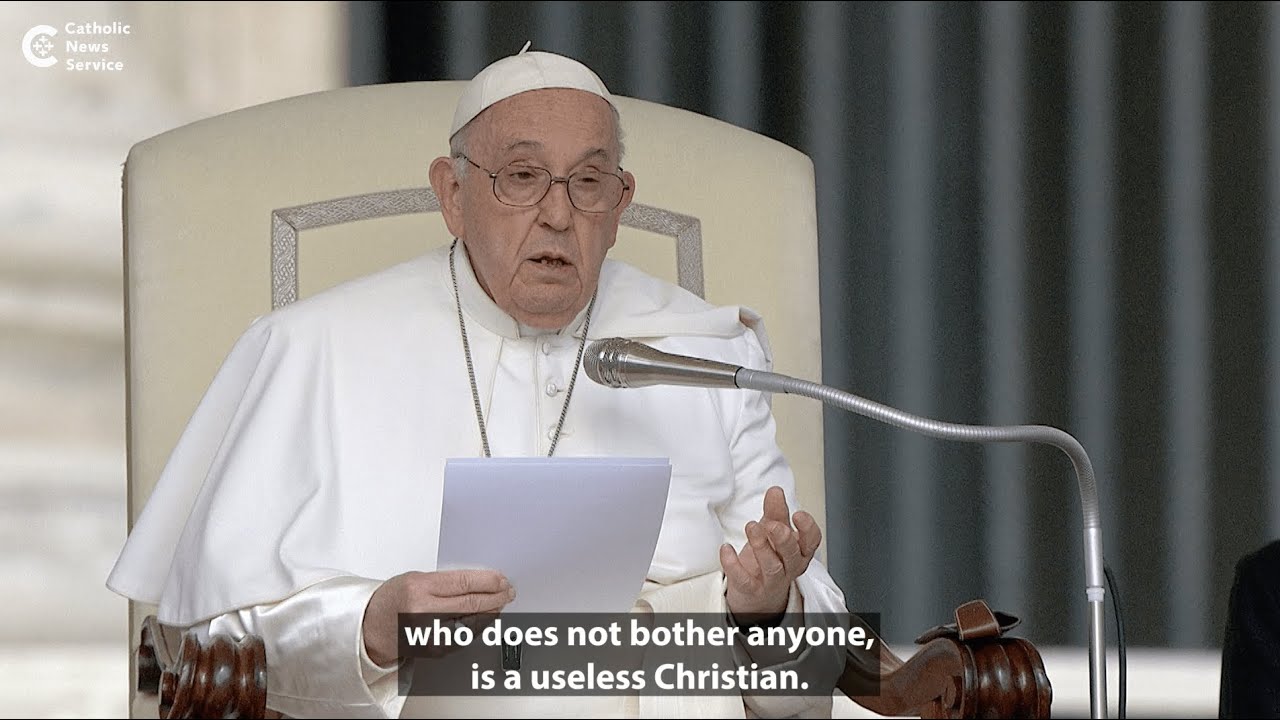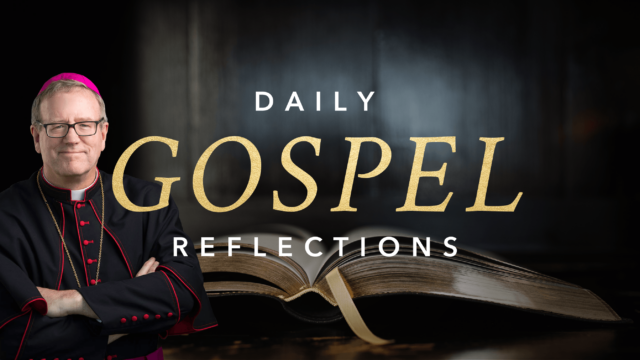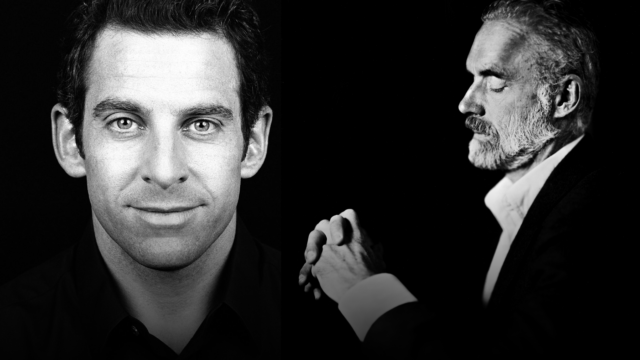
Pope: Have courage to say 'no' to atrocities
Pope Francis continued his catechesis series on virtues and vices by reflecting on the virtue of fortitude.
Posted on 04/12/2024 08:30 AM (USCCB News Releases)
VATICAN CITY (CNS) -- Today's "growing culture of indifference and individualism" must be countered with prayer and adoration, which inspires solidarity with those in need, Pope Francis said.
Charitable efforts guided and inspired by the Catholic faith "must be continually nourished by participation in the life of the church, the reception of the sacraments, and time spent quietly before the Lord in prayer and adoration," the pope told more than 60 members of The Papal Foundation and their families April 12.
The U.S. foundation describes itself as the only charitable organization in the United States dedicated to fulfilling the pope's requests for the needs of the Catholic Church. Donors to the foundation, known as Stewards of St. Peter, make annual pilgrimages to Rome and have an opportunity to meet the pope.
Pope Francis reminded the group that the pilgrimage this year is taking place during the Year of Prayer in preparation for the Holy Year 2025, and he encouraged them to "not forget to adore the Lord" in silent adoration. "We have neglected this form of prayer and we need to take it up again: adoring the Lord in silence."
"Through our perseverance in prayer, we gradually become 'a single heart and soul' with both Jesus and others, which then translates into solidarity and the sharing of our daily bread," he said, referencing a passage from the Acts of the Apostles.
The pope noted that although the donors may not personally meet the beneficiaries of their generosity, "the programs of The Papal Foundation foster a spiritual and fraternal bond with people from many different cultures, languages and regions who receive assistance."
The foundation announced in a statement April 12 that it will dedicate $14.74 million to grants, scholarships and humanitarian aid in 2024.
Close to $10 million will be distributed to grant recipients identified by the Vatican, supporting 118 projects in more than 60 countries, the foundation said, including projects to provide for basic needs such as access to clean water; renovating schools, churches, convents and seminaries; and building health care facilities. The foundation also allocated $4 million to its Mission Fund to provide humanitarian aid and disaster relief, and it will provide $819,000 in scholarships to enable more than 100 priests, women religious and seminarians to study in Rome.
Cardinal Seán P. O'Malley of Boston, chairman of the foundation's board of trustees, said in the statement that the generosity of The Papal Foundation's donors prioritizes the needs of the poor and vulnerable "in a society where the divide between rich and poor continues to grow."
In their meeting, Pope Francis thanked the group for helping the successors of St. Peter "to build up many local churches and care for large numbers of the less fortunate."
Cardinals O'Malley, Blase J. Cupich of Chicago and Wilton D. Gregory of Washington attended the meeting as trustees of the foundation, as well as Archbishops Samuel J. Aquila of Denver and Gregory M. Aymond of New Orleans and Bishop James Checchio of Metuchen, New Jersey.
According to the foundation's website, it has awarded more than $200 million in grants and scholarships selected by the popes since its founding in 1988.
Posted on 04/12/2024 08:30 AM (USCCB News Releases)
ROME (CNS) -- Pope Francis took over the catechism classes at St. John Vianney parish on the far eastern edge of Rome to inaugurate his "School of Prayer."
The pope went, unannounced, to the parish after school April 11 and met with about 200 children, Vatican News reported.
He spoke to them about prayer and answered their questions. He also brought them chocolate Easter eggs and rosaries.
Archbishop Rino Fisichella, pro-prefect of the Dicastery for Evangelization's section for new evangelization, which is coordinating preparations for the Holy Year 2025, had announced the "School of Prayer" in January.
The archbishop said the project would be like the pope's "Fridays of Mercy" initiative during the extraordinary Jubilee of Mercy in 2015- 2016, when the pope visited people on the "peripheries," including babies in a neonatal unit, a center for the blind and a housing project to illustrate the corporal works of mercy.
Pope Francis has asked Catholics around the world to observe 2024 as a "year of prayer" in preparation for the Holy Year.
The pope's lesson for the children focused on the theme of prayers of thanksgiving, the Dicastery for Evangelization said in a statement afterward.
"It is important to say thank you for everything. For example, if you go into someone's house and you don't say thank you or may I or hello, is that nice?" he asked. "The first word is 'thank you.'"
Pope Francis gave each of the children a large folder with his coat of arms on the cover and, inside, a special prayer of thanks composed for the occasion; the prayer thanked God for the gift of life, the gift of parents, the gift of creation and, especially, "the gift of your Son, our brother and savior, friend of the small and the poor."
"You taught us to call you 'Father,' and with your word you call us to live as true sons and daughter, to be brothers and sisters who walk together in the grace of the faith we received with our baptism," the text continued. "Thank you, Lord, who loves us."
Pope Francis asked the children if they pray, and one of the youngsters said his family prays before they eat.
"You said something important," the pope told him. They should all thank the Lord for the food they eat and for giving them families.
Alice, who is 10, asked, "How can I thank the Lord when I'm sick?"
"Even in dark times, we have to thank the Lord because he gives us the patience to tolerate difficulties," the pope responded. "Let's say together: 'Thank you, Lord for giving us the strength to tolerate pain.'"
Sofia, who will receive her first Communion in a few days, said it is hard to thank God when there are wars.
Pope Francis said there is always something to thank God for, and he shared a piece of advice: "Before you go to sleep think, 'What can I thank the Lord for?' And give thanks."
Posted on 04/12/2024 08:00 AM (Word on Fire)

Mark joined Malta Camp USA Director Mary Delaney to discuss the nonprofit summer camp for young adults with intellectual disabilities.
Posted on 04/12/2024 06:00 AM (Word on Fire)

Friends, our Gospel today focuses on St. John’s intense meditation on the meaning of the Eucharist.
Posted on 04/11/2024 08:30 AM (USCCB News Releases)
ROME (CNS) -- The success of the Synod of Bishops on synodality will much depend on also including parish priests in the process, said Cardinal Wilton D. Gregory of Washington.
Of the more than 360 bishops, religious and laypeople who participated in the first assembly at the Vatican last October, the small number who were ordained priests "were scholars, missionaries (or) they were engaged in leadership in religious communities," he said.
"Not that those other participants weren't generous and insightful," he said, but in his 40 years as a bishop, his experience has been that "a number of people may know who the bishop is, they all know who the pastor is."
The parish priest is the church's "point of contact and if we lose contact with our people through their priests, it disables the mission of the church," he told Catholic News Service April 10 at the Pontifical North American College in Rome, where he was to receive the annual Rector's Award April 11.
Cardinal Gregory had served as an auxiliary bishop of Chicago before leading the Diocese of Belleville, Illinois, and then the Archdiocese of Atlanta; he was named archbishop of Washington in 2019 and then elevated to the College of Cardinals the next year.
Pope Francis personally invited the 76-year-old native of Chicago to attend the synod on synodality in Rome.
"There was a lack of parish priests present" at the first assembly, Cardinal Gregory said, noting the importance of the upcoming gathering of 300 parish priests from all over the world to make their contribution to the ongoing synod process by sharing their experiences of parish life.
Parish priests are the ones who "serve the folks in the pew, Sunday after Sunday after Sunday," he said. The gathering of parish priests, which will be held April 28-May 2 outside of Rome, was needed "because if the synod is going to be a success, it really needs to keep its roots in the Sunday pew."
The priests, selected by bishops' conferences and Eastern Catholic churches, also will have the chance to dialogue with Pope Francis as part of responding to the first assembly's report requesting more active involvement of deacons, priests and bishops in the synodal process.
Because there will only be one to four priests representing each bishops' conference and Eastern-rite Catholic church, Cardinal Gregory said it would be important for the priest delegates to "use media to pass on what they did, what they heard, what they said."
"After all, 300 priests is a good delegation, but it's a small representation of the total number of priests who are engaged directly in pastoral ministry," he said.
Just as priests are being asked to "follow up more effectively with their parishioners and learn how to listen to and to learn from criticism and also support" as part of the synodal process, he said, bishops, too, should be showing their support of their priests, even in the simplest of ways.
"Long before the synod and in every diocese that I've served in," he said, he has always shared messages and comments he receives complimenting one of his priests for something they did.
"I always send that complimentary letter to the priest himself, along with my letter of thanks to the individual who thought enough of a pastor to say something nice," he said.
"That builds a relationship with the priest and the bishop that says, 'you know, he contacts me not necessarily because I've done something wrong, but because I've done something right.' And that's very important. Our guys need to know that the bishop is grateful," he said.
The success of the synod, Cardinal Gregory said, will be seen with "an increase in the contact that people, ordinary people, the faithful of God, have with their priests," their bishop and with the pope. Success will be recognizing that the pope "is not an individual who governs the church simply from the desk of the papal apartment" and that the bishop and pastor are not leaders who simply manage or direct activities from afar.
"To have a successful synod outcome, it has to tighten the bonds that unite us, even going into those areas where most people had not been before. And unfortunately, sometimes where bishops haven't been before, that is, in the midst of their flock," he said.
"Isn't that one of Pope Francis' favorite early terms, the smell of the sheep?" the cardinal asked. "You've got to have the smell of the sheep."
Posted on 04/11/2024 08:00 AM (Word on Fire)

Rather than understand the meaning of "dogma," Sam Harris gives his own idiosyncratic meanings, then criticizes figments of his imagination.
Posted on 04/11/2024 06:00 AM (Word on Fire)

Friends, today’s Gospel declares that the Son of God does not ration his gift of the Spirit.
Posted on 04/10/2024 08:30 AM (USCCB News Releases)
VATICAN CITY (CNS) -- While intense feelings or drive -- passions -- are natural, Christians know they must be tamed and channeled toward what is good, Pope Francis said.
The virtue of fortitude, "the most 'combative' of the virtues," helps a person control their passions but also gives them the strength to overcome fear and anxiety when faced with the difficulties of life, the pope told visitors and pilgrims at his weekly general audience April 10.
Continuing his series of talks about virtues, the pope quoted the Catechism of the Catholic Church: "Fortitude is the moral virtue that ensures firmness in difficulties and constancy in the pursuit of the good. It strengthens the resolve to resist temptations and to overcome obstacles in the moral life. The virtue of fortitude enables one to conquer fear, even fear of death, and to face trials and persecutions."
Fortitude "takes the challenge of evil in the world seriously," he said, and that is increasingly rare "in our comfortable Western world."
Some people pretend evil does not exist, "that everything is going fine, that human will is not sometimes blind, that dark forces that bring death do not lurk in history," the pope said. But reading a history book or even the newspaper shows "the atrocities of which we are partly victims and partly perpetrators: wars, violence, slavery, oppression of the poor, wounds that have never healed and continue to bleed."
"The virtue of fortitude makes us react and cry out an emphatic 'no' to evil to all of this," he said.
Fortitude, he said, helps Christians say "'no' to evil and to indifference; 'yes' to the journey that helps us make progress in life, and for this one must struggle."
"A Christian without courage, who does not turn his own strength to good, who does not bother anyone, is a useless Christian," he said.
At the end of the audience, Pope Francis asked people to pray for Ukraine and Palestine and Israel. "May the Lord grant us peace. War is everywhere," he said. "Do not forget Myanmar," where the military staged a coup in 2021 and fighting has continued since then. "Let us ask the Lord for peace and not forget these brothers and sisters who are suffering in these places of war."
Posted on 04/10/2024 08:00 AM (Word on Fire)

We continue our discussion with Katy Carl on "Fragile Objects," her approach to contemporary fiction, and her vocation as a Catholic writer.
Posted on 04/10/2024 06:00 AM (Word on Fire)

In today's Gospel, explore the message of love and salvation: God sent his Son not for condemnation, but for redemption and eternal life.